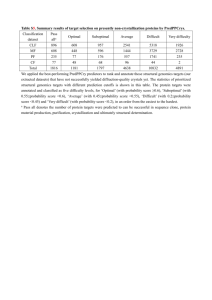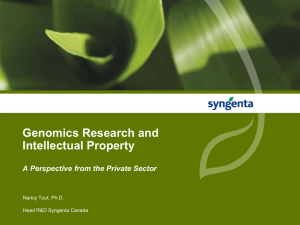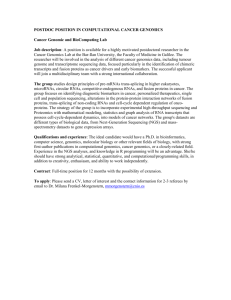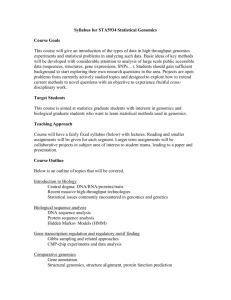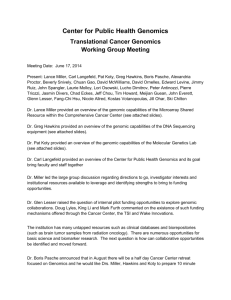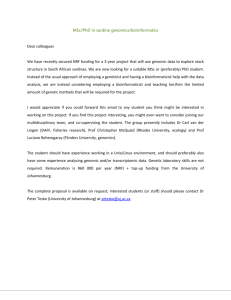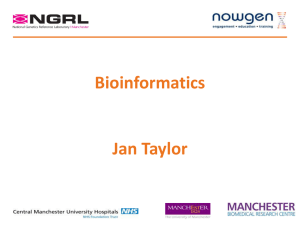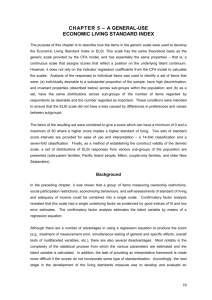Certificate in Genomics, Ethics, and Society (Advisor Vince
advertisement
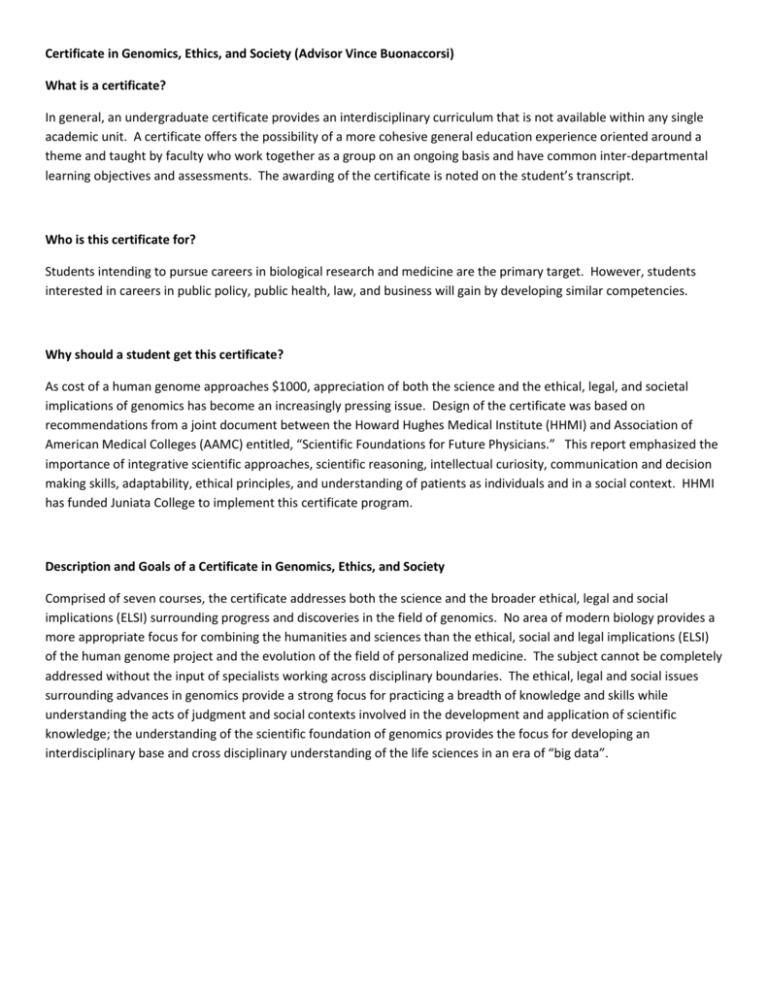
Certificate in Genomics, Ethics, and Society (Advisor Vince Buonaccorsi) What is a certificate? In general, an undergraduate certificate provides an interdisciplinary curriculum that is not available within any single academic unit. A certificate offers the possibility of a more cohesive general education experience oriented around a theme and taught by faculty who work together as a group on an ongoing basis and have common inter-departmental learning objectives and assessments. The awarding of the certificate is noted on the student’s transcript. Who is this certificate for? Students intending to pursue careers in biological research and medicine are the primary target. However, students interested in careers in public policy, public health, law, and business will gain by developing similar competencies. Why should a student get this certificate? As cost of a human genome approaches $1000, appreciation of both the science and the ethical, legal, and societal implications of genomics has become an increasingly pressing issue. Design of the certificate was based on recommendations from a joint document between the Howard Hughes Medical Institute (HHMI) and Association of American Medical Colleges (AAMC) entitled, “Scientific Foundations for Future Physicians.” This report emphasized the importance of integrative scientific approaches, scientific reasoning, intellectual curiosity, communication and decision making skills, adaptability, ethical principles, and understanding of patients as individuals and in a social context. HHMI has funded Juniata College to implement this certificate program. Description and Goals of a Certificate in Genomics, Ethics, and Society Comprised of seven courses, the certificate addresses both the science and the broader ethical, legal and social implications (ELSI) surrounding progress and discoveries in the field of genomics. No area of modern biology provides a more appropriate focus for combining the humanities and sciences than the ethical, social and legal implications (ELSI) of the human genome project and the evolution of the field of personalized medicine. The subject cannot be completely addressed without the input of specialists working across disciplinary boundaries. The ethical, legal and social issues surrounding advances in genomics provide a strong focus for practicing a breadth of knowledge and skills while understanding the acts of judgment and social contexts involved in the development and application of scientific knowledge; the understanding of the scientific foundation of genomics provides the focus for developing an interdisciplinary base and cross disciplinary understanding of the life sciences in an era of “big data”. Learning objectives Students who attain genomics certification will be able to: 1. 2. 3. 4. Describe the basic concepts and principles of genomics. Explain the scope of genomics from genes to society. Integrate knowledge of the chemical, physical, mathematical and computational bases of genomics. Explain the importance of the place of genomics in the human effort to understand natural phenomena, including its history and social impact. 5. Be able to make and justify ethical judgments about genomics research and its uses in medical practice and elsewhere. 6. Use the skills and interdisciplinary perspectives of the liberal arts in understanding trends in genomics and communicating them to academic peers and others. 7. Apply the process of science to questions in genomics. Requirements Four required core courses: 1) A team-taught course that lays the foundations for interdisciplinary work on the ethical and social dimensions of genomics: Genomics Ethics and Society IC 203; Fall IC class. 2) A course covering basic molecular biology, genetics, and genomics: a) Biology II BI106, Fall N division class, has prereqs b) Human Biology BI190, Fall N division class, or c) Sensory Biology BI142, Spring N division class. 3) At least three credits of statistics: a) Biostatistics BI305, Fall N division and QS class, has prereqs, b) Environmetrics ESS 230 Spring N division and QS class, or c) Introductory Probability and Statistics MA 220, Fall and Spring QS and N division class, has prereqs. 4) One course covering informatics and analysis of large data sets: a) Computer Science 110 section G only, Spring N class b) Environmental Genomics Research BI 399, Fall N division class, has prereqs c) Eukaryotic Genomics Research BI 399, Spring N division class, has prereqs, or d) Information Discovery IM 241, Fall QS and S division class, has prereqs. At least three elective courses related to ELSI genomic themes. Any three courses can be taken from the following list: a) Social History of Medicine, History HS 211, Fall class. May count as a either a CA, or an H or I division class. b) Science and Human Values, Philosophy 250, Spring H division class. c) Judgment & Decision Making, Psychology 403/3XX, Summer online, S division class. d) Medicine, Doctors, and Russian Literature, RU 299, Spring. May count as a either a CA, or an H or I division class. e) Medieval Medicine: Health and Disease in the Middle Ages, History 399, Spring class. H Suggested Progression for Biology POEs YEAR Fall 1 2 Biology II Genomics, Ethics, and Society 3 Biostatistics, Informatics 4 ELSI elective 3 Suggested Progression for POEs other than Biology YEAR Fall 1 2 Human Biology (or Sensory bio in spring) Genomics, Ethics, and Society 3 ElSI elective 2 or summer, Informatics 4 ELSI elective 3 Spring Summer ELSI elective 1 Informatics ElSI elective 2 or summer ELSI elective Spring Summer ELSI elective 1 Informatics Environmetrics or Intro Prob and Stat ELSI elective Management Plan Students must submit a notice of intent to complete the certificate to Prof. Vince Buonaccorsi before junior year. The certificate may be approved by Vince Buonaccorsi, Jill Keeney, Jay Hosler, Jim Roney, or Loren Rhodes (the certificate advisory board). Courses other than those listed above may also apply if approved by this group. No more than two classes may overlap between the certificate and a student’s POE or a secondary emphasis. __________________________________________________________________ Beyond the certificate, the following are additional suggested courses and experiences related to the overall learning objectives of the Genomics Leadership Initiative at Juniata College Two proposed classes providing leadership skill and practice 1) Executive in Residence Program, Kathy Baughman 2) Leadership, Marlene Burkhardt Research experiences 1) Summer research at Juniata or elsewhere 2) Independent research for credit during the semester (e.g. BI 489) 3) Course-based research experiences such as Molecular Techniques and Field and Stream.
![9_Komlenac - start [kondor.etf.rs]](http://s2.studylib.net/store/data/005352037_1-bdc91b0717c49a75493200bca431c59c-300x300.png)
